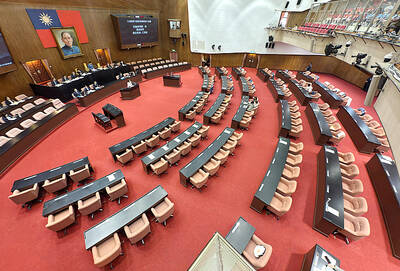Nine Iranians were released yesterday from US custody in Iraq, including two the military had accused of being members of an elite Iranian force suspected of arming Shiite extremists in Iraq.
The nine were released to Iraqi officials, and were being transferred to the Iranian Embassy in Baghdad, the US military said in a statement. They were expected to return to Iran later yesterday, it said.
The nine Iranians included two men -- identified by the military for the first time as Brujerd Chegini and Hamid Reza Asgari Shukuh -- who were among five people captured when US forces stormed an Iranian government office in the northern city of Irbil in January.
At the time, US officials accused them of being members of Iran's elite Quds Force, an arm of the Revolutionary Guards that Washington has accused of funding and arming Shiite extremists fighting US forces in Iraq. Iran said the five were diplomats working in a facility that was undergoing preparations to be a consular office.
The building, along with another Iranian office in Sulaimaniyah, was shut after the Jan. 11 raid. Both offices -- located in the two largest cities of Iraq's semi-autonomous Kurdish zone -- reopened on Tuesday as Iranian consulates.
The US statement said the Iranians were released after a "careful review of individual records to determine if they posed a security threat to Iraq, and if their detention was of continued intelligence value."
"All nine individuals were determined to no longer pose a security risk," it said.
The release came a day after US authorities freed about 500 Iraqi prisoners in an ongoing push to empty US jails of detainees no longer deemed a threat.
But the military says it's still holding 25,800 Iraqis waiting to face charges or be given freedom.
About 17,000 of those were captured this year, in largely successful campaigns to secure Baghdad and its surrounding belts, the military said.
In Tehran, Foreign Ministry spokesman Mohammad Ali Hosseini told state radio: "From the beginning of the abduction of the five Iranian diplomats, we said they were innocent. Now the US military has confirmed it."
Hosseini said that he hoped the remaining three Iranians detained in Irbil would also be released soon. He also reiterated Tehran's offer for talks with US and Iraqi diplomats.
Also see: Washington tells EU firms to leave Iran

CROSS-STRAIT COLLABORATION: The new KMT chairwoman expressed interest in meeting the Chinese president from the start, but she’ll have to pay to get in Beijing allegedly agreed to let Chinese Nationalist Party (KMT) Chairwoman Cheng Li-wun (鄭麗文) meet with Chinese President Xi Jinping (習近平) around the Lunar New Year holiday next year on three conditions, including that the KMT block Taiwan’s arms purchases, a source said yesterday. Cheng has expressed interest in meeting Xi since she won the KMT’s chairmanship election in October. A source, speaking on condition of anonymity, said a consensus on a meeting was allegedly reached after two KMT vice chairmen visited China’s Taiwan Affairs Office Director Song Tao (宋濤) in China last month. Beijing allegedly gave the KMT three conditions it had to

‘BALANCE OF POWER’: Hegseth said that the US did not want to ‘strangle’ China, but to ensure that none of Washington’s allies would be vulnerable to military aggression Washington has no intention of changing the “status quo” in the Taiwan Strait, US Secretary of Defense Pete Hegseth said on Saturday, adding that one of the US military’s main priorities is to deter China “through strength, not through confrontation.” Speaking at the annual Reagan National Defense Forum in Simi Valley, California, Hegseth outlined the US Department of Defense’s priorities under US President Donald Trump. “First, defending the US homeland and our hemisphere. Second, deterring China through strength, not confrontation. Third, increased burden sharing for us, allies and partners. And fourth, supercharging the US defense industrial base,” he said. US-China relations under

The Chien Feng IV (勁蜂, Mighty Hornet) loitering munition is on track to enter flight tests next month in connection with potential adoption by Taiwanese and US armed forces, a government source said yesterday. The kamikaze drone, which boasts a range of 1,000km, debuted at the Taipei Aerospace and Defense Technology Exhibition in September, the official said on condition of anonymity. The Chungshan Institute of Science and Technology and US-based Kratos Defense jointly developed the platform by leveraging the engine and airframe of the latter’s MQM-178 Firejet target drone, they said. The uncrewed aerial vehicle is designed to utilize an artificial intelligence computer

The Chinese Nationalist Party (KMT) caucus yesterday decided to shelve proposed legislation that would give elected officials full control over their stipends, saying it would wait for a consensus to be reached before acting. KMT Legislator Chen Yu-jen (陳玉珍) last week proposed amendments to the Organic Act of the Legislative Yuan (立法院組織法) and the Regulations on Allowances for Elected Representatives and Subsidies for Village Chiefs (地方民意代表費用支給及村里長事務補助費補助條例), which would give legislators and councilors the freedom to use their allowances without providing invoices for reimbursement. The proposal immediately drew criticism, amid reports that several legislators face possible charges of embezzling fees intended to pay